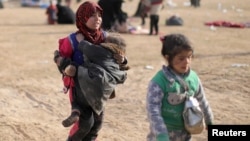An influx of thousands of people fleeing Islamic State has created "dire" conditions at the al-Hol camp in northeastern Syria, the aid agencies working there said on Tuesday.
About 15,000 people have arrived at the camp in the last week alone as the U.S.-backed Syrian Democratic Forces (SDF) lay siege to the last vestige of Islamic State's territorial rule at the besieged village of Baghuz near the Iraqi border.
"The conditions are definitely dire in the camp ... the problem is nobody was expecting these kinds of numbers so it has been overwhelming and it hasn't stopped," said Misty Buswell, spokeswoman for the International Rescue Committee (IRC).
"People are turning up with the clothes on their backs, and children barefoot without coats. Providing shelter in the camp is a big challenge as there are not enough tents," she told the Thomson Reuters Foundation by phone from Jordan.
The United Nations said last week it was "gravely concerned" about the plight of thousands of civilians fleeing the last ISIL-held areas after intense fighting.
Aid agencies said they were struggling to provide medical care and shelter for the new arrivals, while water supplies were being stretched thin in the camp. About 90 percent of the nearly 57,000 people now living there are women and children.
Some people are having to sleep outside due to a lack of tents, said Sara Al-Zawqari, spokeswoman for the International Committee of the Red Cross (ICRC).
"Several families, including those with infants, slept in the open and under blankets hung from the fences, exposed to the cold weather and rain," she said in an emailed statement.
Dozens more have died during the journey or shortly after reaching the camp, most of them children under five, according the United Nations.
In January, the World Health Organization (WHO) said at least 29 children and newborns had died, mainly from hypothermia, with many making the long journey in open trucks or on foot.
"A major concern for us is the children after this long journey in cold weather ... some are malnourished and unaccompanied," said Salam Al-Janabi, spokesman for the U.N. children's agency, by phone from Damascus.
More than 400 children were being treated for moderate acute malnutrition in the camp, said Al-Janabi.
Many people are also coming to the camp with respiratory illness and injuries from shrapnel or land mines, said the IRC.





